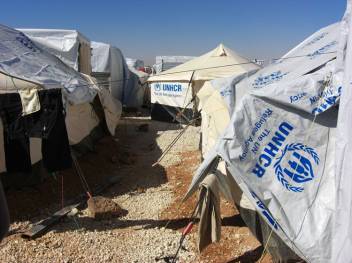 In my role as HelpAge’s Emergencies Health and Nutrition Advisor, I recently travelled to Jordan.
In my role as HelpAge’s Emergencies Health and Nutrition Advisor, I recently travelled to Jordan.
My aim was to collect information on the humanitarian situation and response to the Syrian refugee crisis by meeting relevant stakeholders including UN agencies and NGOs.
I was also tasked with collecting information on the situation and needs of Syrian older people and whether they are being addressed in the current humanitarian response. In particular, I sought to examine the health and nutrition needs and response, but also more general protection and access to humanitarian assistance.
Poor security situation in camps
As we have all heard and seen on the news, the humanitarian situation in the region is catastrophic. Officially, there are around 180,000 Syrian refugees in Jordan, a large part of the 230,000 who have been pre-registered across several countries in the region. Zaatari camp right in the north of Jordan, where I went has around 100,000 refugees, although it was built for only 20,000.
The situation in Zaatari is very bad, with poor security and agencies not being able to cope with the influx of refugees.
The food available in the camp is passable but agencies are still struggling to provide adequate types of food for people. At the moment, the World Food Programme (WFP) is providing a general ration to people consisting of bread, rice, oil, among other things with UNHCR providing a complementary ration for everybody, consisting of canned food, cheese, hummus and tuna.
Soon WFP will be distributing food vouchers, so that people can buy the food they want at the camp market: you can find everything there, from chicken, bread, cakes to vegetables and fruits.
Older people make up 2% of the camp population, 930 are men and 1,540 women. This percentage is now creeping up to 3% with the new arrivals.
When it comes to health services, all people 60 and above are considered vulnerable and there is a system of identification and referral. They account for around 15% of the sick people in the health facilities.
Life is extremely difficult
In the camp, I met Souhad who is 72 and used to live in a farming village near Daara. She is suffering from severe arthritis in both her knees, which makes it difficult for her to walk. She is also treated for several chronic diseases, including diabetes, high blood pressure, etc…
She said: “Life became very difficult in the last few weeks, the Government army started to target our village. I was not able to reach the shelter so I stayed at home and witnessed the death and destruction.”
As more people left the village, she decided to leave as well. At the same time, her grand-niece, Monal, who is 23 decided to leave too. They hired seats in a car going to the border but were stopped 1.5 km from Jordan and had to walk across the border in the dark. For Souhad, it was an ordeal to walk that distance with her bad knees. At the Jordanian border, they were transported to Zaatari by an ambulance, because of Souhad’s condition.
Now Monal and Souhad are living in a tent which is almost empty, without electricity or heat. They have received a few blankets and two mattresses, but Souhad says that she feels cold. The previous week, the tent was flooded because of the heavy rains, and they had to move and stay with neighbours. Now, the tent is dry and they have come back.
They received a food package, but Monal found it difficult to carry it on her own. The food ration is not adapted to Souhad’s diabetes, as it does not include any vegetables.
Important that older people are not forgotten
From what I witnessed it is important that older people’s needs are not forgotten at this stage. There is a huge need to advocate for specific community services for older and vulnerable people in many areas. These include protection, such as registration in the camp, distributions, access to services, as well as health and shelter.
When it comes to health, we need to identify community health workers, volunteers or home-based carers and train them for identify the most vulnerable. At the moment, those who cannot reach clinics or hospitals are not being treated, which is extremely worrying.
HelpAge International is currently collaborating with Handicap International on its response to the Syrian refugee crisis in Jordan. We are using our joint expertise to help identify the needs of the most vulnerable groups affected by the conflict in Syria, including older people and people with disabilities, to ensure their access to essential relief services, and to look at the best ways of providing further assistance to them.
Read more about our work to support older people in emergencies.
